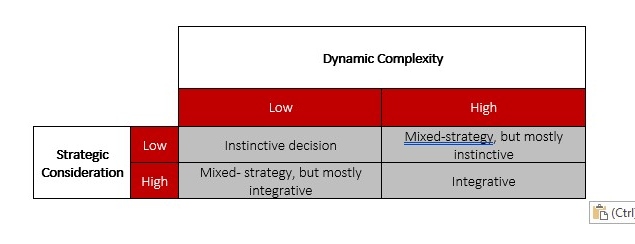Dr. Joseph Long
This article is part of a companion series to “Crisis Management: Seven Steps to Prepare Your Organization,” which appeared in the Winter 2019 issue of West Virginia Executive.
Can we afford to expand into a new market? Can we afford not to? If we expand, where should we go? When?
These are the types of decisions executive leaders face every day. In today’s complex world, decisions like these can make or break organizations. Leaders must balance long-term strategic concerns with the operational choices and opportunities that emerge daily. That is why tools and models that help them make better decisions are invaluable.
The Decision-Making Matrix
Leaders who practice focused and quick decision-making expect that faster decisions will yield a competitive edge. However, there are times when a more collaborative and contemplative approach will produce greater longevity and strategic efficiencies. The matrix below presents an approach leaders can apply to improve their decision-making capabilities. It combines a leader’s observation of strategic consideration with a decision’s dynamic complexity, and it illustrates a decision-making strategy that maximizes the efficiency between three decision-making styles: instinctive, or simple and direct; integrative, or complex and multi-dimensional; and mixed. The matrix is critical because if a leader misjudges either the strategic consideration or the complexity of a decision, the results can be disastrous.
The matrix suggests that when a decision has low strategic consideration and low dynamic complexity, a leader can afford to make a simple and instinctive choice. However, if it has high strategic consideration and high complexity, an executive leader must apply a more complex and integrative approach to determine how to proceed.

When Leaders Apply the Right—or Wrong—Approach to Making Decisions
Making an instinctive decision when it calls for contemplative consideration or contemplating when a decision is simple and requires a rapid response can both lead to negative results. For example, consider the following examples to illustrate this point:
- Applying the Right Approach
When faced with the decision to execute the raid against Osama Bin Laden in 2011, President Barrack Obama applied a mixed strategy, which reflected low strategic consideration with high complexity. Obama traditionally applied an integrative style in his leadership. However, in this instance, he acted more instinctually, which ultimately served him well and enabled him to make the quick decisions necessary for the given situation.
- Applying the Wrong Approach
In contrast, consider Tesla CEO Elon Musk. Widely regarded as one of the most innovative and inventive minds of our time, Musk has come under considerable criticism for his reckless use of communications. His casual comments and cavalier tweets have proven to cause volatile changes in his company’s stock price, shock investors and even elicit rebukes from the Securities and Exchange Commission. He could well benefit from taking a more contemplative approach that considers the dynamic complexities of his operating environment.
Executive-level leaders must remain rooted in establishing long-term stability through decision making and vision. As such, their decision-making skills must remain adaptable to varying contexts despite personal preferences. When faced with similar situations, this matrix can provide insight for strategic leaders to exercise judgment, particularly in cases that are in conflict with their natural decision-making style.
Creating Executive Leaders
The types of executive leaders who make solid decisions to move their companies and organizations forward are invaluable. The University of Charleston’s (UC) Doctor of Executive Leadership program is designed for leaders seeking to maximize their executive value to organizations, communities and institutions like making important decisions. This rigorous program integrates theory with practice and develops skills for senior-level executives working in a wide variety of industries and sectors. Participating students become experts in:
- Executive decision making
- Complexity
- Organizational and personal ethics
- Business theory
- Leadership development
- Organizational dynamics
The program is designed to train leaders in the effective use of business principles while providing skill development and understanding of a wide range of areas. UC offers leadership programs for students at all levels, including undergraduate degrees in organizational leadership, frontline leadership and crisis and emergency leadership andgraduate degrees in strategic leadership in addition to the doctoral program.
About the Author
Dr. Joseph Long is a retired Green Beret officer, West Point graduate and certified executive coach in Fayetteville, NC. He earned his Doctorate of Executive Leadership from the University of Charleston in 2019. He serves as adjunct faculty for the University of Charleston and leadership trainer and coach for college and professional athletes. Long is also a writer and speaker.


